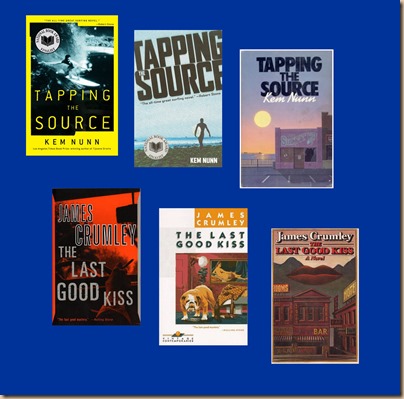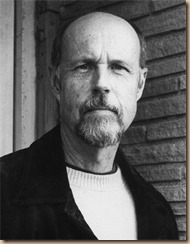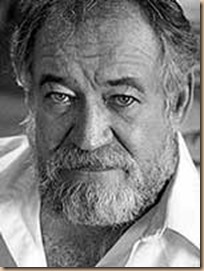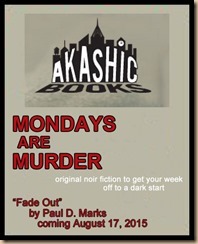 The books are “Tapping the Source” by Kem Nunn and “The Last Good Kiss” by James Crumley. Several decades ago a friend of mine in the WGAw turned me onto these books, telling me how terrific they were. Thank you, Elliot.
The books are “Tapping the Source” by Kem Nunn and “The Last Good Kiss” by James Crumley. Several decades ago a friend of mine in the WGAw turned me onto these books, telling me how terrific they were. Thank you, Elliot.He told me about both at the same time. Both sounded good, so I rushed out to get them (this was in the olden days when you had to actually go somewhere to buy a book). And I read them right away.
I was blown away by “Tapping the Source”. And I liked “The Last Good Kiss,” a lot, but maybe because I so fell in love with Tapping, Kiss paled by comparison. I know this is sacrilege to some. But hey, that’s what makes horse races.
“Tapping the Source” is Nunn’s first novel and with it he pretty much invented his own genre: surf noir. I guess I’m not the only one who likes it since it was a finalist for the National Book Award.
 It’s the story of a pretty naïve and innocent kid from Bakersfield, California—Buck Owens country—who travels to Huntington Beach, CA, the surf capital of the world, in search of his sister. There, he gets involved with a bunch of mysterious and maybe evil bikers and sees the dark side of “surf city”. This definitely ain’t the Beach Boys world of surf, sun and California Girls.
It’s the story of a pretty naïve and innocent kid from Bakersfield, California—Buck Owens country—who travels to Huntington Beach, CA, the surf capital of the world, in search of his sister. There, he gets involved with a bunch of mysterious and maybe evil bikers and sees the dark side of “surf city”. This definitely ain’t the Beach Boys world of surf, sun and California Girls.I liked this book so much that I wanted to option the film rights for it. I had them checked out, but they had already been optioned/bought. That had to be at least 25 years ago, probably more, a lot more. But to this day there is still no movie version of this story. It is, however, said that “Point Break,” with Patrick Swayze and Keanu Reeves was, uh, inspired by “Tapping the Source”. The story is different and imho not nearly as good.
Nunn went on to write several other books, including a couple that fall into the surf noir category. He also did the Hollywood thing, writing/producing for “Deadwood” and “Sons of Anarchy,” and creating the series “John from Cincinnati,” set in Imperial Beach down near the Mexican border.
***
Crumley’s hardboiled “The Last Good Kiss” starts out heading in one direction and quickly makes a U-turn, slamming around a dark, noir corner. PI C.W. Sughrue is hired to find Abraham Trahearne before he drinks himself to death.
And he finds him, on the first page of the book:
“When I finally caught up with Abraham Trahearne, he was drinking beer with an alcoholic bulldog named Fireball Roberts in a ramshackle joint just outside of Sonoma, California, drinking the heart right out of a fine spring afternoon.”
―James Crumley, “The Last Good Kiss”
So there wouldn’t be much of a story if there weren’t complications, would there? So: Trahearne gets shot in the ass in the bar. And while waiting for him to recuperate, Sughrue is hired to look into the ten year old disappearance of the bar owner’s daughter.

The novel weaves through the darkest corners of some of the darkest streets in America. A hard drinking, tough Viet Nam vet, a man with a moral code, Sughrue is a PI for the 1970s. And maybe, just maybe for the 21st century as well.
“Stories are like snapshots, pictures snatched out of time, with clean hard edges. But this was life, and life always begins and ends in a bloody muddle, womb to tomb, just one big mess, a can of worms left to rot in the sun.”
―James Crumley, “The Last Good Kiss”
Men’s Journal named “The Last Good Kiss” #12 on its list of Top 15 Thrillers of All Time and George Pelacanos put it at #3 on his list of Five Most Important Crime novels.
***
If Nunn is known for surf noir, Crumley is the granddaddy of post Viet-Nam hardboiled PI’s. He influenced many current writers, but, like Nunn, never had the big breakthrough that brought him a wide mainstream audience. They’re both like that little band that you love, but only you and a small cult of other loyal followers or groupies love or know about. And in some ways if that band or those authors, in this case Nunn and Crumley, were to get discovered by the masses you would feel a loss. Crumley died in 2008, but he’s left behind an impressive collection of novels and short stories worth checking out.
So, if you haven’t read these books or aren’t familiar with these authors maybe you’d want to check them out. If you are familiar with them, maybe it’s time to revisit them. I’d love to hear your opinions.
***
![Pageflex Persona [document: PRS0000037_00019] Pageflex Persona [document: PRS0000037_00019]](https://lh3.googleusercontent.com/-Pv1yuZ7N8_k/VbV5U8cvjVI/AAAAAAAACXM/tn46gOS5PmU/Vortex-Kindle-Cover-FD3%252520%2525282%252529_thumb.jpg?imgmax=800) Vortex: My new Mystery-Thriller coming September 1st.
Vortex: My new Mystery-Thriller coming September 1st. ...a nonstop staccato action noir... Vortex lives up to its name, quickly creating a maelstrom of action and purpose to draw readers into a whirlpool of intrigue and mystery... but be forewarned: once picked up, it's nearly impossible to put down before the end.
—D. Donovan, Senior Reviewer, Midwest Book Review

Fade Out: flash fiction story coming on Akashic’s Mondays Are Murder, Monday (big surprise, huh?), August 17th. Here’s the link, but my story won’t be live till 8/17: http://www.akashicbooks.com/tag/mondays-are-murder/
***
And check out my updated website www.PaulDMarks.com
Click here to subscribe to my Newsletter: Subscribe to my Newsletter
*Crumley B/W photo is free to share and use per Bing.com useage rights.
###






















